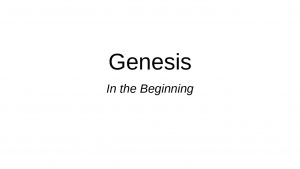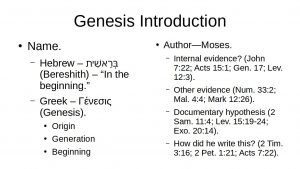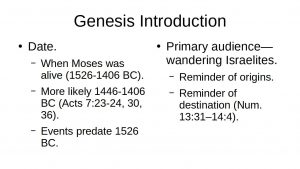Genesis Introduction
Hebrew.
In Hebrew, it is known as Bereshith.
It is taken from the first Hebrew word of the book, translated as “In the beginning.”
Greek.
The LXX calls it “Genesis” which means “Origin,” “Generation,” or “Beginning.”
This title comes to the Latin Vulgate and into English.
 Author – historically and traditionally believed to be Moses.
Author – historically and traditionally believed to be Moses.There is no direct indication in Scripture, however, that Moses authored it.
Genesis does not directly identify its author.
No other book in the Bible attributes Genesis to Moses.
The closest allusion is the reference that Moses gave them circumcision (John 7:22; Acts 15:1), though it was introduced to Abraham in Gen. 17.
Of course God gave it to them through Abraham, but Moses codified it in other parts of the Law (Lev. 12:3).
But that does not mean Moses did not write it.
First, there is no indication internally that Moses is not the author.
Second, Winton argues that the Pentateuch (first five books of the Bible) should be viewed as a unit, and there is plenty of biblical evidence that Moses wrote the rest of it (Num. 33:2; Mal. 4:4; Mark 12:26; etc.).
Third, every other ancient extrabiblical source that has commented on this states that Moses is the author (e.g. Philo, Josephus).
Critical scholarship suggests multiple authors for the Pentateuch.
This is called the “documentary hypothesis.”
They basically state that several different unknown writers wrote a portion of it, and some editors came in later to compile it into one document.
One writer seems to prefer using “Yahweh” and another seems to prefer using “Elohim” for identifying God, the oldest existing only after King Solomon’s reign.
Of course, this is utter nonsense, but I want you to be aware of it so you can recognize it as nonsense.
Such people assume far too much about the Bible, denying the supernatural and holding the Bible up to an unreasonable standard.
One major question is, how can these people have transgressed a Law that didn’t exist yet? (e.g. 2 Sam. 11:4; cleansed from impurity – Lev. 15:19-24; adultery – Exo. 20:14).
So how did Moses write about these events in Genesis he clearly did not witness?
By inspiration of the Holy Spirit (2 Tim. 3:16; 2 Pet. 1:21).
But this does not negate other sources that the Holy Spirit may have used to help Moses write this book.
Much of it comes from oral tradition.
Moses had many of these things come down, passing from God to Adam to Seth to Noah to Abraham to Jacob.
As you’ll note in the ages of the individuals in Genesis 5 and 11, they are able to relate these events to their children and children’s children until Moses has the chance to write them down.
And while Moses was raised as an Egyptian (Acts 7:22), he did not incorporate Egyptian creation myth into his creation story, nor do we see Mesopotamian (Abraham’s origin) or Canaanite (the Promised Land) creation myths.
Some of these things may have been common knowledge, such as the Table of Nations and where they went in Genesis 10.
Since we have narrowed it down to Moses, it must be in the time when he was alive.
Following the chronology back, we can date the exodus to 1446 BC.
It is unlikely he wrote it while in Pharaoh’s house (1526 – 1486 BC) or in his time in Midian (1486 – 1446 BC).
This leaves the 40 years the Israelites were in the wilderness (1446 – 1406 BC).
The events recorded in Genesis clearly predate when it was written, long before 1526 BC.
There is some debate about how long the Israelites were in Egypt.
It ranges from 430 years to 215 years.
This would make Genesis 46 occur in either 1876 or 1661 BC.
So, Moses would have had to rely on the oral traditions handed down with guidance of the Holy Spirit.
Any further speculations as to when this was written is folly.
Primary audience – the Israelites in the wilderness.
They are in need of a cohesive narrative to remind them of where they came from.
They had spent hundreds of years in Egyptian slavery.
They had to be reminded that they had not always been slaves, that they are a people who belong to God.
There were promises that they were given, dating back to Abraham, or even further to Eve, that they could latch onto while they are wandering in the wilderness.
It also would remind them that the land they were going to was given to them by God.
They had lost that idea in Egypt.
This is evident by the reluctance and fear they experienced in the wilderness and when presented with the Canaanites they were to drive out of the land (e.g. Num. 13:31–14:4).
Writing this would help the next generation see where they came from and have faith in God to keep His promises since they had no issues entering into Canaan.
This book should also help us build our faith as well.


